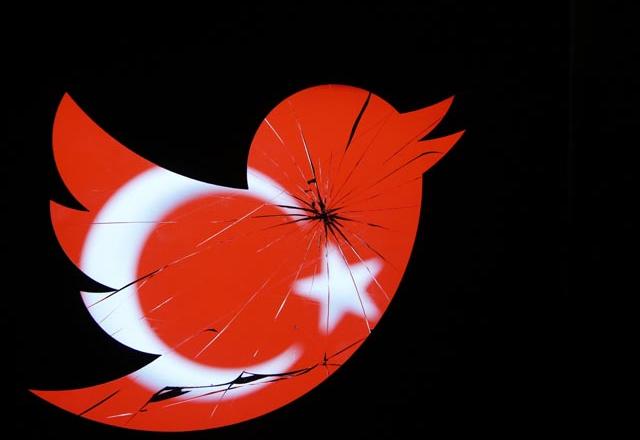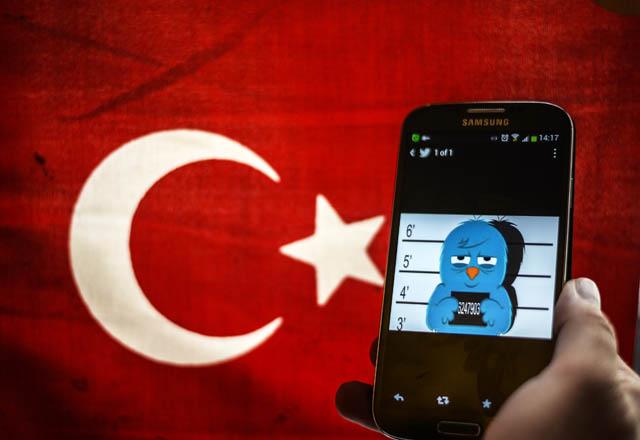You are here
Erdogan defiant despite Gul hope Turkey will lift Twitter ban
By AFP - Mar 23,2014 - Last updated at Mar 23,2014
ANKARA — Turkey’s defiant Prime Minister Recep Tayyip Erdogan launched a fierce new attack on social media on Sunday, just hours after the president voiced hope the government would soon lift its controversial ban on Twitter.
The conflicting comments from Erdogan and President Abdullah Gul underscore what appears to be a growing gulf between the two men just a week before crucial local elections.
The Twitter ban has been condemned by critics as a bid to muzzle a widening corruption scandal dogging the government and has drawn strong rebukes from rights groups and Turkey’s Western allies.
“I believe this problem will be over soon,” Gul told reporters before leaving for a visit to the Netherlands.
“This is of course an unpleasant situation for such a developed country as Turkey, which has weight in the region and which is negotiating with the European Union.”
The ban was implemented Thursday shortly after Erdogan threatened to “wipe out” Twitter.
On Sunday, Erdogan also took aim at popular Facebook and YouTube which he had previously threatened to ban after the local polls are held on March 30.
“I cannot understand how sensible people still defend Facebook, YouTube and Twitter. They run all kinds of lies,” he said at an election rally in the northwestern province of Kocaeli.
“I am obliged to take measures in the face of any attack threatening my country’s security even if the world stands up against us.”
The government on Saturday accused Twitter of being “biased and prejudiced” and said the US-based social media giant had failed to abide by hundreds of court orders to remove content deemed illegal.
Erdogan and his Islamic-rooted Justice and Development Party (AKP) have been rocked by a corruption scandal that has ensnared members of the political and business elite.
The AKP is also struggling to shake off the after-effects of mass anti-government protests last year that were organised partly on Twitter, prompting Erdogan to label the site a “menace”.
“Blocking access to Twitter is the work of a government which is losing its self-confidence and strength,” veteran journalist Kadri Gursel wrote in the Milliyet newspaper.
Social media networks have been flooded almost daily with recordings allegedly depicting Erdogan talking with his son about hiding vast sums of money and interfering in court cases, business deals and media coverage.
Erdogan has dismissed most of the recordings as “vile” fakes concocted by his political rivals, including US-based cleric Fethullah Gulen, once a staunch ally.
Erdogan’s office says his opponents used Twitter to carry out “systematic character assassinations”.
Erdogan, who has been in power for 11 years, is accused of ruling the aspiring EU member with increasing authoritarianism and imposing his conservative values on society.
The government has also come under fire for curbs on the judiciary and the Internet and for jailing more reporters than any other country, including serial offenders Iran, China and Eritrea.
Douglas Frantz, assistant secretary of public affairs at the US State Department, described the Twitter ban as “21st-century book burning”.
“A friend like Turkey has nothing to fear in the free-flow of ideas and even criticism represented by Twitter. Its attempt to block its citizens’ access to social media tools should be reversed,” he wrote in an official blog.
Frustrated Turks have been able to access the site by tweeting via text message or tweaking their computers’ Internet settings. Methods include changing their domain name system (DNS) settings or going online via a virtual private network (VPN).
But since Saturday there have been unconfirmed reports that the government is trying to block access to lists of alternative DNS numbers.
Gul, a frequent social media user, took to Twitter on Friday to denounce the ban, becoming the highest level leader to circumvent the block, along with some ministers.
The president, who hails from Erdogan’s AKP, has emerged as a more conciliatory leader than the Turkish premier.
But he also drew criticism last month for signing a controversial AKP-sponsored law to tighten government control over the Internet.
Related Articles
Turkey said on Saturday that Twitter was “biased” and had been used for “systematic character assassinations” of Prime Minister Recep Tayyip Erdogan’s government, a day after Ankara’s ban on the site prompted an international outcry.
Turkey lifted a much-criticised block on Twitter on Thursday, 24 hours after its highest court had overturned the ban as a breach of the right to free speech.
Turkey’s embattled prime minister has warned that his government could ban popular social media networks YouTube and Facebook after a number of online leaks added momentum to a spiralling corruption scandal.


















